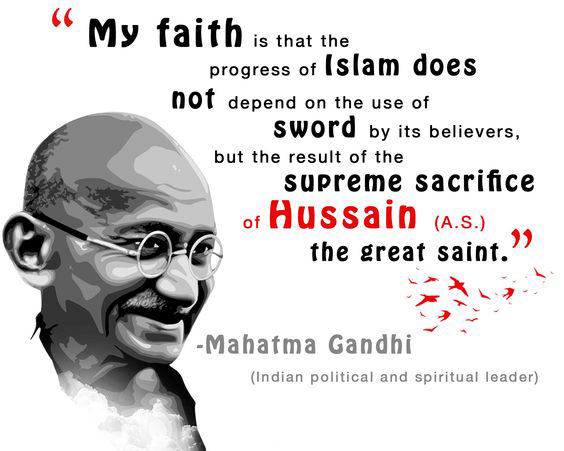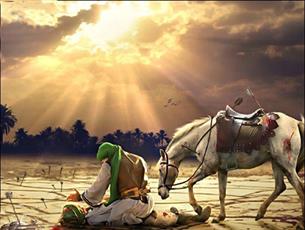Hawzah News Agency- AS you might have already heard some of these quotes before, not only Muslims and Shia scholars admire Imam Husain but also there a lot of non-Muslim authors and scholars who had fascinating opinion about the great sacrifice of humanity.
Dr. K. Sheldrake writes:
“Of that gallant band, male and female knew that the enemy forces around were implacable, and were not only ready to fight, but to kill. Denied even water for the children, they remained parched under the burning sun and scorching sands, yet not one faltered for a moment. Husain marched with his little company, not to glory, not to power of wealth, but to a supreme sacrifice, and every member bravely faced the greatest odds without flinching.”
Dr. Radha Krishnan writes:
“Though Imam Hussain gave his life years ago, but his indestructible soul rules the hearts of people even today.”
The tragedy of Karbala took place in 680 AD on the banks of the Euphrates in Iraq but Karbala has a universal appeal and in today’s climate of violence, it is more relevant than ever. The tragedy of Karbala and its spirit of non-violent resistance and supreme sacrifice has been a source of inspiration to the likes of Mahatma Gandhi and Pandit Nehru.
Mahatma Gandhi’s first Salt Satyagrah was inspired by Imam Hussain’s nonviolent resistance to the tyranny of Yazid. Gandhi is said to have studied the history of Islam and Imam Hussain (A), and was of the opinion that Islam represented not the legacy of a sword but of sacrifices of saints like Imam Hussain (A).
Mahatma Gandhi writes:
“My faith is that the progress of Islam does not depend on the use of sword by its believers, but the result of the supreme sacrifice of Hussain (A), the great saint.”
Nehru considered Karbala to represent humanities strength and determination. He writes:
“Imam Hussain’s (A) sacrifice is for all groups and communities, an example of the path of righteousness.”
Dr. Rajendra Prasad writes,
“The sacrifice of Imam Hussain (A) is not limited to one country, or nation, but it is the hereditary state of the brotherhood of all mankind.”
Dr. Radha Krishnan writes,
“Though Imam Hussain (A) gave his life almost 1300 years ago, but his indestructible soul rules the hearts of people even today.”
Swami Shankaracharya describes,
“It is Hussain’s (A) sacrifice that has kept Islam alive or else in this world there would be no one left to take Islam’s name.”
Mrs. Sarojini Naidu writes,
“I congratulate Muslims that from among them, Hussain (A), a great human being was born, who is reverted and honored totally by all communities”
Simon Ockley (1678-1720), the Professor of Arabic at the University of Cambridge writes:
“Then Husain mounted his horse, and took the Koran and laid it before him, and, coming up to the people, invited them to the performances of their duty: adding, ‘O God, thou art my confidence in every trouble, and my hope in all adversity!’… He next reminded them of his excellencies, the nobility of his birth, the greatness of his power, and his high descent, and said, ‘Consider with yourselves whether or not such a man as I am is not better than you; I who am the son of your prophet’s daughter, besides whom there is no other upon the face of the earth. Ali was my father; Jaafar and Hamza, the chief of the martyrs, were both my uncles; and the apostle of God, upon whom be peace, said both of me and my brother, that we were the chief of the youth of paradise. If you will believe me, what I say is true, for by God, I never told a lie in earnest since I had my understanding; for God hates a lie. If you do not believe me, ask the companions of the apostle of God [here he named them], and they will tell you the same. Let me go back to what I have.’ They asked, ‘What hindered him from being ruled by the rest of his relations.’ He answered, ‘God forbid that I should set my hand to the resignation of my right after a slavish manner. I have recourse to God from every tyrant that doth not believe in the day of account.’”
[The History of the Saracens, London, 1894, pp. 404-5]
Ignaz Goldziher (1850-1921), the Famous Hungarian orientalist scholar writes:
“Ever since the black day of Karbala, the history of this family … has been a continuous series of sufferings and persecutions. These are narrated in poetry and prose, in a richly cultivated literature of martyrologies – a Shi’i specialty – and form the theme of Shi’i gatherings in the first third of the month of Muharram, whose tenth day(‘ashura) is kept as the anniversary of the tragedy at Karbala. Scenes of that tragedy are also presented on this day of commemoration in dramatic form (ta’ziya). ‘Our feast days are our assemblies of mourning.’ So concludes a poem by a prince of Shi’i disposition recalling the manymihan of the Prophet’s family. Weeping and lamentation over the evils and persecutions suffered by the ‘Alid family, and mourning for its martyrs: these are things from which loyal supporters of the cause cannot cease. ‘More touching than the tears of the Shi’is’ has even become an Arabic proverb.”
[Introduction to Islamic Theology and Law, Princeton, 1981, p. 179]



Your Comment